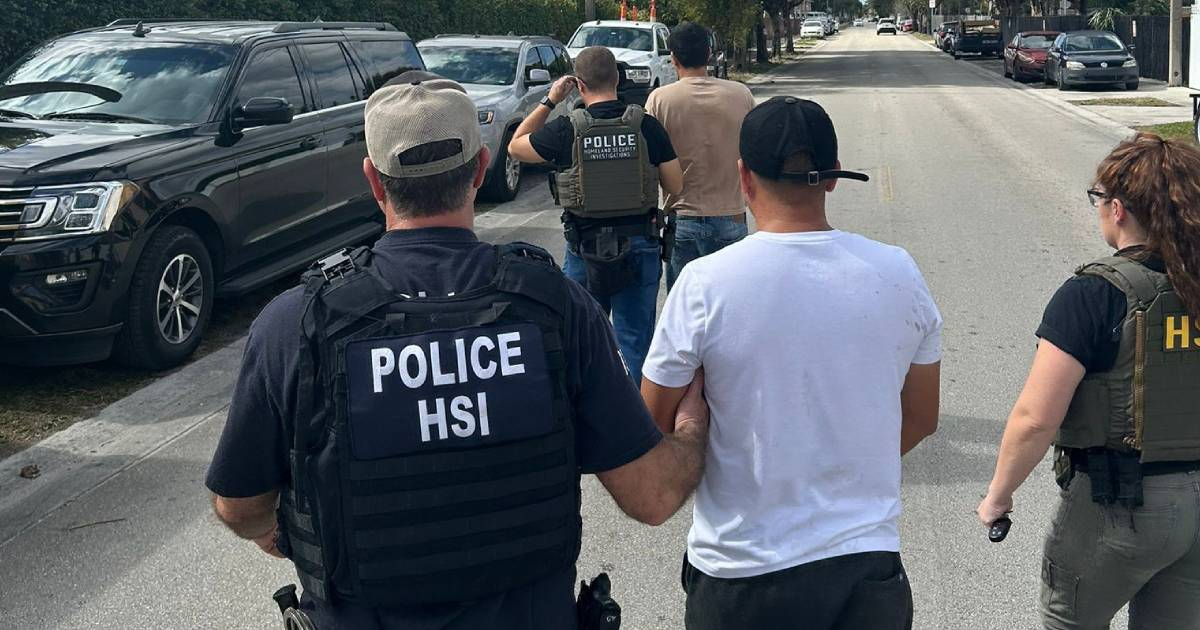
Related videos:
At least 18 Cubans holding the I-220A form have been detained in southern Florida in recent days after attending their scheduled appointments with the Immigration and Customs Enforcement (ICE), according to reports from immigration attorneys.
The information was originally published by the Miami Herald and has raised concerns in the Cuban community of South Florida.
The detainees are part of the group of migrants who were released under supervision after entering the United States, but who still do not have a defined immigration status.
In some cases, these citizens have resided in the country for more than a year, complying with the regulations imposed by ICE, such as regularly attending their immigration appointments.
However, attorneys consulted by the Miami Herald warn that these arrests reflect a hardening of the immigration policies of the Trump administration, affecting a group that has historically received differential treatment within the U.S. immigration system.
According to reports, the majority of those detained are women who attended their verification appointments at the ICE office in Miramar.
Cases like that of Beatriz Monteagudo, a 25-year-old Cuban woman who was detained on March 10 and subsequently transferred to a detention center in San Diego, have raised alarm among immigrants and their families.
Monteagudo, according to her friend Johan Ariel, participated in the protests of July 11, 2021, in Cuba and fears she will be imprisoned if deported.
The attorney Rebeca Sánchez-Roig, cited by the Miami Herald, described the measure as "unusual," but clarified that it is not illegal.
Another case that has raised concern is that of Laura de la Caridad Sánchez, a 27-year-old Cuban who was also detained during her immigration appointment in Miramar.
His lawyer, Eduardo Soto, stated that immigration authorities did not provide clear explanations regarding his detention, other than that it was in response to orders coming from Washington.
Soto expressed his willingness to take legal action if his client is not released and described the arrests as a strategy to instill fear among the migrant community.
So far, the Department of Homeland Security has not issued an official statement regarding the arrests nor has it answered questions from the Miami Herald about whether Cubans with I-220A are now a detention priority.
Meanwhile, legislators like Cuban-American Congresswoman María Elvira Salazar have expressed concern over the situation and urged ICE not to detain migrants with this status until their cases are processed.
The I-220A form is a document that certifies the release of a person under immigration custody subject to specific conditions, but it does not grant legal status.
In recent years, thousands of Cubans have received this document after crossing the border with Mexico, and many of them have sought asylum or attempted to pursue other routes to regularize their stay in the U.S.
However, federal judges have ruled that the I-220A cannot be used to apply for permanent residency under the Cuban Adjustment Act.
The situation of Cubans with this migratory status is concerning, as according to a recent report, nearly 550,000 Cubans in the United States could face the risk of deportation due to the lack of clear pathways for regularization and the new measures implemented by President Donald Trump, which include the indefinite suspension of humanitarian parole programs.
The uncertainty about their legal future and the implementation of stricter measures by ICE has generated alarm among immigrants and their families, who fear being unexpectedly detained, as has happened in the recent raids in southern Florida.
Frequently Asked Questions about the Detention of Cubans with I-220A in Florida
What is the I-220A form and what does it imply for Cuban immigrants in the U.S.?
The I-220A form is a "Release on Recognizance Order" that allows the release of individuals from federal custody under certain conditions, such as attending immigration hearings and not violating local or federal laws. However, it does not grant legal status or allow for status adjustment under the Cuban Adjustment Act, leaving beneficiaries in a state of legal uncertainty. Thousands of Cubans have received this document upon crossing the border, facing a complex and uncertain immigration process.
Why have Cubans with I-220A been arrested during their appointments with ICE?
The arrests of Cubans with I-220A during their appointments with ICE appear to reflect a tightening of the immigration policies of the Trump administration, which has promised to end the "catch and release" policy. Although ICE has not provided clear explanations, these actions have caused alarm among immigrants. Many detainees have no criminal records and have met the I-220A requirements, raising concerns about the motivations behind these arrests.
What measures are lawyers and congress members taking to protect Cubans with I-220A?
Immigration attorneys are working to secure the release of detainees, arguing that the detentions are unjust and unnecessary. Additionally, Cuban-American Congresswoman María Elvira Salazar has voiced her concern and urged ICE not to detain more Cubans until their cases are processed. The pressure on the Department of Homeland Security (DHS) is crucial in seeking a definitive solution that grants legal status to I-220A beneficiaries.
What is the impact of the tightening of immigration policies on Cubans with I-220A?
The tightening of immigration policies, driven by the Trump administration, is generating uncertainty and fear among Cubans with I-220A. The new oversight measures, such as the Intensive Supervision Appearance Program (ISAP), impose stricter monitoring, increasing pressure on immigrants who are already living in a state of legal uncertainty. The Cuban community fears that these actions could lead to mass deportations and is appealing to their political representatives to take action on their behalf.
Filed under: